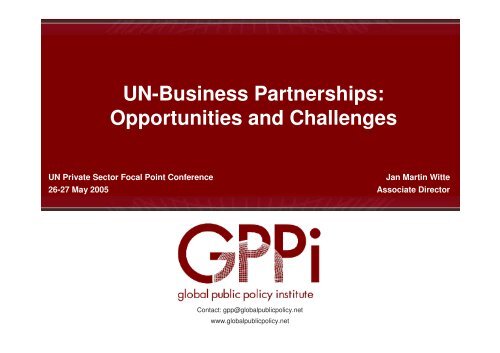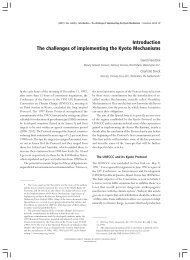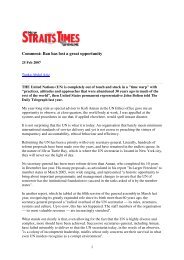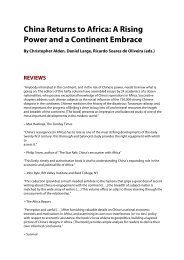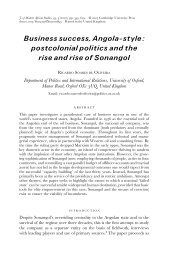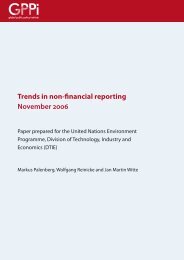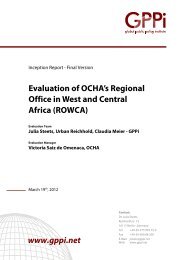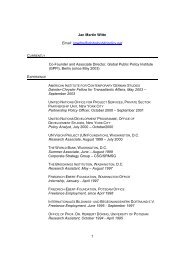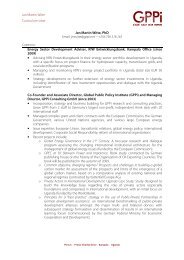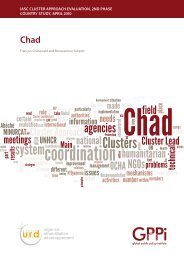UN-Business Partnerships: Opportunities and Challenges
UN-Business Partnerships: Opportunities and Challenges
UN-Business Partnerships: Opportunities and Challenges
Create successful ePaper yourself
Turn your PDF publications into a flip-book with our unique Google optimized e-Paper software.
<strong>UN</strong>-<strong>Business</strong> <strong>Partnerships</strong>:<br />
<strong>Opportunities</strong> <strong>and</strong> <strong>Challenges</strong><br />
<strong>UN</strong> Private Sector Focal Point Conference<br />
26-27 May 2005<br />
Jan Martin Witte<br />
Associate Director<br />
Contact: gpp@globalpublicpolicy.net<br />
www.globalpublicpolicy.net<br />
© GPPi 2005
Key findings<br />
1<br />
2<br />
3<br />
4<br />
Local ownership <strong>and</strong> good management are critical to partnership<br />
success.<br />
The United Nations often lacks appropriate incentives systems <strong>and</strong><br />
capabilities, both individual <strong>and</strong> institutional, to help foster local<br />
ownership <strong>and</strong> good partnership management.<br />
The business community regards partnerships with the United Nations<br />
as critical to future business success. However, they also characterize<br />
the United Nations as a weak partnership player.<br />
The United Nations needs to take a number of steps in order to remove<br />
barriers for more effective <strong>and</strong> impact-oriented partnerships.<br />
1
Agenda<br />
• <strong>Partnerships</strong> <strong>and</strong> the <strong>UN</strong>: Key issues<br />
• The business perspective<br />
• Action agenda<br />
2
The political debate is on, the jury is still out<br />
3
One possible way of categorizing partnerships is along their functional<br />
role<br />
Function Advocacy Developing rules,<br />
norms <strong>and</strong><br />
st<strong>and</strong>ards<br />
Sharing <strong>and</strong><br />
coordinating<br />
resources<br />
Harnessing<br />
markets for<br />
development<br />
Examples<br />
• Health in your<br />
h<strong>and</strong>s<br />
• Mondialogo<br />
• GRI<br />
• Who cares<br />
wins<br />
• Judges in<br />
Venezuela<br />
• Stop TB<br />
• Shea Butter<br />
Burkina Faso<br />
• Microinsurance<br />
Contribution<br />
• Place issues<br />
on global<br />
agenda<br />
• Prepare the<br />
ground for<br />
action<br />
• Fill governance<br />
gaps<br />
• Increase inclusiveness<br />
<strong>and</strong> accountability<br />
• Exploit<br />
economies of<br />
scale in<br />
knowledge<br />
generation<br />
• Build capacity<br />
• Provide<br />
access to<br />
markets<br />
• Bridge or<br />
deepen<br />
markets<br />
4
Research highlights importance of local ownership <strong>and</strong> strong<br />
partnership managements as key<br />
Local ownership<br />
• Substantial influence of<br />
beneficiaries<br />
• Implementation through local<br />
partners<br />
Strong management<br />
• Clear goals <strong>and</strong> objectives<br />
• Efficient <strong>and</strong> transparent<br />
partner selection process<br />
• Clear roles <strong>and</strong><br />
responsibilities<br />
• Impact assessment<br />
• ...<br />
Sustainable <strong>and</strong> impact-oriented partnerships<br />
5
The United Nations lacks the incentives <strong>and</strong> capabilities to contribute<br />
to local ownership <strong>and</strong> strong partnership management<br />
Mission alignment<br />
Institutional<br />
Incentives <strong>and</strong> resources<br />
• Additional resources from<br />
donors for partnerships<br />
• Effective coordination in<br />
the <strong>UN</strong> system<br />
Capabilities<br />
• Impact assessment tools<br />
• Practical legal guidelines<br />
• System-wide learning<br />
• ...<br />
Individual<br />
• Time <strong>and</strong> other resources<br />
for developing<br />
partnerships<br />
• Continual education offers<br />
• Recognition<br />
• ...<br />
• <strong>Business</strong> experience<br />
• Partnership brokering<br />
skills<br />
6
Agenda<br />
• <strong>Partnerships</strong> <strong>and</strong> the <strong>UN</strong>: Key issues<br />
• The business perspective<br />
• Action agenda<br />
7
The length of a company's membership in the Global Compact has an<br />
important influence on the number of partnerships it is involved in<br />
Years of membership in the Global Compact <strong>and</strong> number of partnerships (n=147)<br />
Years of membership<br />
in the Global<br />
Compact<br />
Number of partnerships<br />
None 1 2 or 3 4 or 5 >5<br />
Less than 1 year<br />
19<br />
19<br />
10<br />
1<br />
2<br />
1 to 3 years<br />
14<br />
11<br />
20<br />
2 2<br />
More than 3 years<br />
6<br />
12<br />
12<br />
10 7<br />
8
Almost 80 percent of participating companies see partnerships as<br />
important for their future business success<br />
"<strong>Partnerships</strong> with the <strong>UN</strong> will become more <strong>and</strong> more important for my company´s<br />
future business success." (answers in percent, n=145)<br />
Strongly Agree<br />
17<br />
Strongly Disagree<br />
2<br />
Disagree<br />
19<br />
62<br />
Agree<br />
9
Good corporate citizenship <strong>and</strong> reputation are the most important<br />
drivers behind business engagement in partnerships<br />
Rating of factors for decision to join partnerships (in percent)<br />
Showing good<br />
corporate citizenship<br />
Increasing reputation<br />
Very important<br />
37<br />
49<br />
Important<br />
48<br />
44<br />
Neutral<br />
10<br />
Not<br />
important<br />
Fairly<br />
important<br />
7<br />
1<br />
0<br />
32<br />
Individual leadership<br />
34<br />
36<br />
22<br />
4 5<br />
Improving the investment<br />
environment<br />
13<br />
48<br />
24<br />
8<br />
8<br />
Meeting government<br />
requirements<br />
17<br />
35<br />
30<br />
2<br />
15<br />
100%<br />
10
Almost half respondents do not think it easy to build partnerships with<br />
the <strong>UN</strong>; less than a third sees the <strong>UN</strong> as effective<br />
"It is easy to build partnerships<br />
with the <strong>UN</strong>" (n=129)<br />
"How effective is the <strong>UN</strong> in responding to<br />
partnership requests by business?" (n=125)<br />
Strongly Agree Strongly disagree<br />
7 2<br />
Very effective<br />
2<br />
Not at all effective<br />
6<br />
Effective<br />
26<br />
40<br />
Disagree<br />
Agree<br />
54<br />
65<br />
Fairly<br />
effective<br />
11
Bureaucracy <strong>and</strong> lack of underst<strong>and</strong>ing of corporate culture seen as<br />
most significant impediments for the <strong>UN</strong> to be an effective partner<br />
Rating of factors (in percent)<br />
Fairly<br />
important<br />
Not important<br />
Very important Important Neutral<br />
Bureaucracy<br />
23<br />
43<br />
28<br />
5<br />
2<br />
Lack of underst<strong>and</strong>ing 23<br />
40<br />
21<br />
11<br />
5<br />
Lack of coordination<br />
16<br />
41<br />
28<br />
8<br />
6<br />
Lack of resources<br />
17<br />
30<br />
39<br />
6<br />
8<br />
Lack of skills<br />
7<br />
28<br />
40<br />
11<br />
15<br />
Lack of Leadership<br />
11<br />
24<br />
44<br />
14<br />
8<br />
100%<br />
12
Agenda<br />
• <strong>Partnerships</strong> <strong>and</strong> the <strong>UN</strong>: Key issues<br />
• The business perspective<br />
• Action agenda<br />
13
Action agenda<br />
1. Build capacity in country offices<br />
2. Promote training, at all levels<br />
3. Streamline guidelines for partnerships<br />
4. Improve coherence <strong>and</strong> practicality of partner selection process<br />
5. Build the foundation for smart selectivity through systematic impact<br />
assessment<br />
6. Foster system-wide learning<br />
14
Additional material<br />
15
<strong>Partnerships</strong> opportunities structured both by <strong>UN</strong>SG <strong>and</strong> individual <strong>UN</strong><br />
body guidelines<br />
Overall <strong>UN</strong>SG value<br />
framework<br />
• General principles<br />
• Use of <strong>UN</strong> logo<br />
<strong>and</strong> emblem<br />
• ...<br />
• ...<br />
"<strong>Partnerships</strong> are<br />
voluntary <strong>and</strong><br />
collaborative<br />
relationships between<br />
various parties, both<br />
State <strong>and</strong> non-State, in<br />
which all participants<br />
agree to work together to<br />
achieve a common<br />
purpose or undertake a<br />
specific task <strong>and</strong> to share<br />
risks <strong>and</strong><br />
responsibilities,<br />
resources <strong>and</strong> benefits"<br />
Detailed agency<br />
guidelines<br />
• Goals <strong>and</strong><br />
objectives<br />
• Partner selection<br />
process<br />
• Operational<br />
workflows<br />
• ...<br />
• ...<br />
16
Most participating firms have more than 500 employees<br />
Number of employees of participating firms (in percent, n=149)<br />
Less than 250<br />
26<br />
Between 250 <strong>and</strong> 500<br />
3<br />
71<br />
More than 500<br />
17
Survey respondents come from all industry sectors<br />
Sectoral affiliation of participating companies (number of companies, n=221*)<br />
Industrials<br />
Retail<br />
Natural Resources<br />
Engineering<br />
Banking <strong>and</strong> Finance<br />
Technology<br />
Health <strong>and</strong> Medicine<br />
Telecoms<br />
Building <strong>and</strong> Construction<br />
Transport<br />
Agriculture <strong>and</strong> Fisheries<br />
Professional Services<br />
Media<br />
6<br />
8<br />
8<br />
13<br />
13<br />
11<br />
11<br />
24<br />
22<br />
21<br />
19<br />
19<br />
46<br />
* Multiple answers possible<br />
18
Length of participation in Global Compact is evenly distributed<br />
Years of involvement in partnerships (in percent, n=147)<br />
Less than a year<br />
35<br />
33<br />
One to three years<br />
32<br />
More than three years<br />
19
Bureaucracy <strong>and</strong> lack of underst<strong>and</strong>ing seen as most significant<br />
impediments for the <strong>UN</strong> to be an effective partner<br />
Rating of factors (in percent)<br />
Fairly<br />
important<br />
Not important<br />
Very important Important Neutral<br />
Bureaucracy<br />
23<br />
43<br />
28<br />
5<br />
2<br />
Lack of underst<strong>and</strong>ing 23<br />
40<br />
21<br />
11<br />
5<br />
Lack of coordination<br />
16<br />
41<br />
28<br />
8<br />
6<br />
Lack of resources<br />
17<br />
30<br />
39<br />
6<br />
8<br />
Lack of skills<br />
7<br />
28<br />
40<br />
11<br />
15<br />
Lack of Leadership<br />
11<br />
24<br />
44<br />
14<br />
8<br />
100%<br />
20
Companies who view partnerships as important for future business<br />
also have a more involved top management<br />
Correlation of importance given to partnerships <strong>and</strong> involvement of senior management<br />
(in percent of each category)<br />
"<strong>Partnerships</strong> will<br />
become increasingly<br />
important"<br />
"We discuss partnership issues with our senior<br />
management"<br />
Regularly<br />
Irregularly Not at all<br />
Strongly agree 78<br />
17<br />
4<br />
Agree<br />
45<br />
45<br />
9<br />
Disagree<br />
20<br />
60<br />
20<br />
Strongly disagree<br />
33<br />
0<br />
67<br />
21


